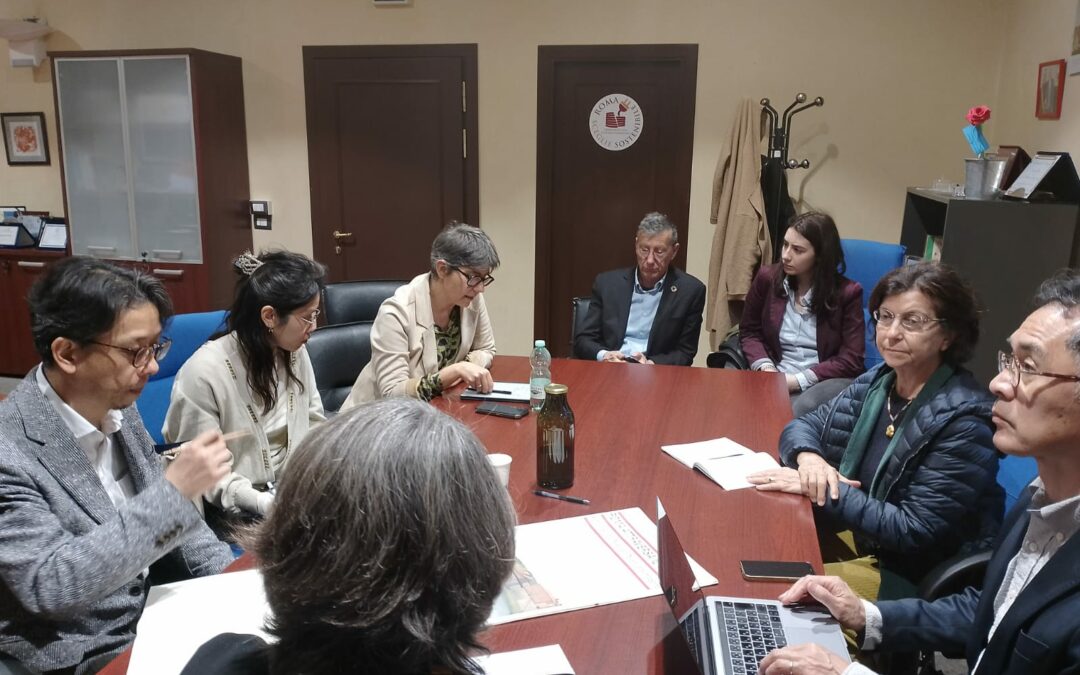Professor Davide Marino is the leader of the research team who created the Food Atlas for the Metropolitan City of Rome, and, recently, the Observatory on Food Poverty, both driven with the University Consortium for Socioeconomic and Environmental Research CURSA, on behalf of the Metropolitan City of Rome.
The Professor invited Professor Shuji Hisano from Japan along with a delegation from Kyoto University and the city to Rome’s Department of the Environment. They discussed many aspects of the food system, from Rome’s Food Policy, the FUSILLI Living Lab, Food Council, Food Atlas, and the participatory processes.
Check out our previous article about the visit, Kyoto Calls Rome: A Tale of Cities
The Interview
We finally addressed Professor Marino with three questions about the visit and the discussions that followed with the Japanese colleagues.
Professor Marino,
What struck you most about Hisano’s experiences in his country (participatory or not) ?
According to what our Japanese colleagues have told us, in Japan there are still no developed food policies, however the union between the scientific research sector and civic movements is being created, which has also been important in many other parts of the world, including Rome. Also, there are no urban agriculture projects or research in Japan. The colleagues in the delegation asked us scientifically how to set up this new discipline for them, and how to involve experts and researchers from other disciplines.
If food is – as it is – a transversal theme, it is very important to pool knowledge and work together: each dimension opens the door to new research. Only after you understand the multifunctional approach, you are then able – and in need to – organize the different methodologies and themes.
What you think struck Professor Hisano the most about the Roman food policy experience?
I think that our experience struck Professor Hisano precisely because of its bottom-up character, and, moreover, in contrast with what happens for instance in Milan. And I believe that the ability to give life to the proposal in the absence of funding and, at least initially, neither European projects has also been recognised. Another element can be identified in the extreme variety of experiences and strengths that they found in Rome.
Kyoto, as Professor Hisano’s colleague told us, is among the cities that have signed up to the MUFFP but have not yet begun action. So far, they have studied the ways of developing food policies especially in the Netherlands. The theme interests them above all as regards the methods of governance, and the resolution of the inevitable conflicts to be overcome and settled in order to create it. In Rome, the food policy started bottom-up, 2 years before FUSILLI, with universities, researchers, bodies, associations, organizations and farms and their tenacious advocacy activity. In Rome, our Japanese colleagues found many of the answers they were looking for.
Food policies need a lot of work before they take hold: in 2020 in the Promoting Committee for the food policy in Rome there were 7 people who wrote the first draft of the first “manifesto”, then we became 50 subjects, then 100. In parallel, Roma Capitale and Risorse per Roma have been participating in European projects on the themes of urban agriculture, urban gardens, participation and civic citizenship on sustainability for 10 years. We all raised a sort of green wave: in the end, politics had to follow us!
Today in Italy we are part of the Italian Local Food Policies Network, which promotes and supports governance processes for a sustainable food system in all cities that support human relations. It was born as a research group but little by little associations, policymakers, weighty organizations are arriving… and we are already about 600 subjects, including the FUSILLI teams of Rome and Turin. And we publish a magazine, RE|CIBO, to keep everyone updated on the progress of food policies.
In Rome, our Japanese colleagues found many of the answers they were looking for.
What was, in your opinion, the utility of FUSILLI project, and what function may it still have, in the implementation of the food policy and in the transition process of the food system in Rome?
Personally – it is not an evaluation but a perception, I believe that FUSILLI project still has to play the most important part in Rome’s food policy. In this phase it performed an important function of support and infrastructure for the construction of the processes that were proposed by the committees and stakeholders and, eventually, launched by the new administration. I think FUSILLI “system” and method could play a more substantial role in the future, turning into an active, stable pool of trained resources, provided there is adequate investment.
